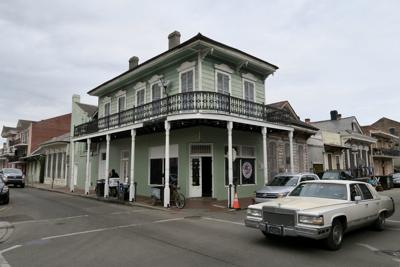After closing, Matassa’s Market will return in French Quarter with same name, new operator

Staff file photo by Ian McNulty
Last week, Matassa’s Market closed its doors and put a question mark over the future of a nearly century-old fixture of French Quarter neighborhood life.
Now, work is underway to bring the small grocery back, with a new operator but with the same name over the door and a goal to fulfill the same role, updated a bit.
This new Matassa’s Market is slated to open in about a month. It will be a full-service grocery as before, but it’s getting an overhaul.
Its deli will be back in action and so will its delivery bikes, a common sight around the French Quarter shuttling groceries directly to customers’ homes.

Staff photo by Ian McNulty
The store at the corner of Dauphine and St. Philip streets had been run by the Matassa family since 1924. Third-generation owner Louis Matassa was the face of the operation for decades, a perpetual presence behind the cash register up front.
More recently he brought on Vincent Catalanotto Jr., of the Vincent’s restaurant family, as a business partner.

STAFF PHOTO BY SOPHIA GERMER
Matassa and Catalanotto own the building. When preparing to close last week, they said little about future plans for the market.
On Friday, they completed a lease for the building to Richard Djapni, a pharmacist based in Monroe, La. Djapni has a string of independent groceries and pharmacies around Louisiana that each operate under different names. Matassa’s Market will be his first business in the New Orleans area.
Adrian Nagy, a grocery and retail developer working on the project for Djapni, said work is underway to renovate and reopen the store swiftly.
Before closing, Louis Matassa and Catalanotto each bemoaned the diminishing number of residents in the French Quarter and declining business.
But Nagy believes that with new investment in equipment and a fresh look at how the store selects and stocks inventory, the grocery can be successful.

STAFF PHOTO BY SOPHIA GERMER
“You have to respond to the market and the changes in demographics here,” Nagy said. “You have to find ways to bring the old customers back and appeal to the visitors who stay nearby now.”
Nagy has worked with other groceries that have built new niches in the local market, including Big Easy Fresh Market, an international grocery that opened last year in Mid-City. Refining selection and presentation are keys to making stores like this work, she said.

STAFF PHOTO BY SOPHIA GERMER
When renovations are complete at Matassa’s, customers will notice changes right up front, with a selection of flowers, a coffee bar and a clear view of the liquor, beer and wine selection. That was always an important part of the store’s business and it is now being expanded, Nagy said.
The store will still stock grocery staples and household goods along with a wider array of fresh produce. Nagy said they’re interested in getting more local brands in the mix, including baked goods and more fresh products.
While Djapni operates pharmacies in other locations, Nagy said they are still assessing the feasibility of adding one at Matassa’s.
Deep roots
The Matassa name goes back deep in New Orleans history. Louis’ father was Cosimo Matassa, the late record producer who helped shape some of the early sounds of rock ‘n’ roll. He recorded hits from a pantheon of greats, including Fats Domino, Ray Charles, Little Richard, Professor Longhair, Allen Toussaint, Irma Thomas, Dave Bartholomew and the Meters.

L. S. DeLaune
The family’s grocery was started by Cosimo’s own father, Giovanni Matassa, when the French Quarter was home to so many of his fellow Sicilian immigrants it was known as “Little Palmero.” Today, Louis Matassa can point out the front door to where a half-dozen similar Italian groceries once operated, now converted to apartments, bars or restaurants.
Matassa’s Market continued as a holdover from bygone times in some ways, but it also served as an anchor for the French Quarter’s evolving neighborhood character.

STAFF PHOTO BY SOPHIA GERMER
As the new operators work on plans for the store, Nagy said she’s looking closely at aspects that worked for Matassa’s through the years. That includes small things. For instance, half-price pizza on Wednesdays had been a popular draw for Matassa’s in the past, Nagy noted, and that’s coming back soon.
For all the changes now planned, the store’s history is an important factor to maintain, said Amiee Figueroa, a consultant working on the new market.
A chronological timeline of the store’s history will extend across one wall, she said, and old signs and photos will remain.
“It’s very important for us to keep the heritage,” Figueroa said. “We want to keep the customers who have always come here and have more people come back. When they do they’ll find a place that’s familiar but has been freshened up.”
Louis Matassa is taking some time off now, but he said he may return to the grocery to help out and lend support.

STAFF PHOTO BY SOPHIA GERMER
At age 70, he was working 80 to 85 hours a week; he was there whenever the store was open.
“It’s my life, it’s been that way ever since I was a kid,” he said.
That made letting go of the business difficult, though his regulars helped him through it.
“It was really tough working those last few days,” Matassa said. “But I got a good response from the neighbors coming in here telling me what we mean to them.”
One of those neighbors is William Fagley. He lives next to the store, and he considers it an extension of his home. The store would take deliveries of packages when neighbors weren’t home to receive them, and the Matassa’s crew always had a gauge on neighborhood news.
The prospect of losing the corner grocery had his circle of neighbors feeling despondent, he said.
“It was like we were in mourning, we felt like we’d lost a great friend,” Fagley said.
News that Matassa’s would return, even with a different operator, came as a relief. He predicted the neighborhood will rally around it.
“We’re thrilled,” he said. “The neighborhood needs its grocery.”




